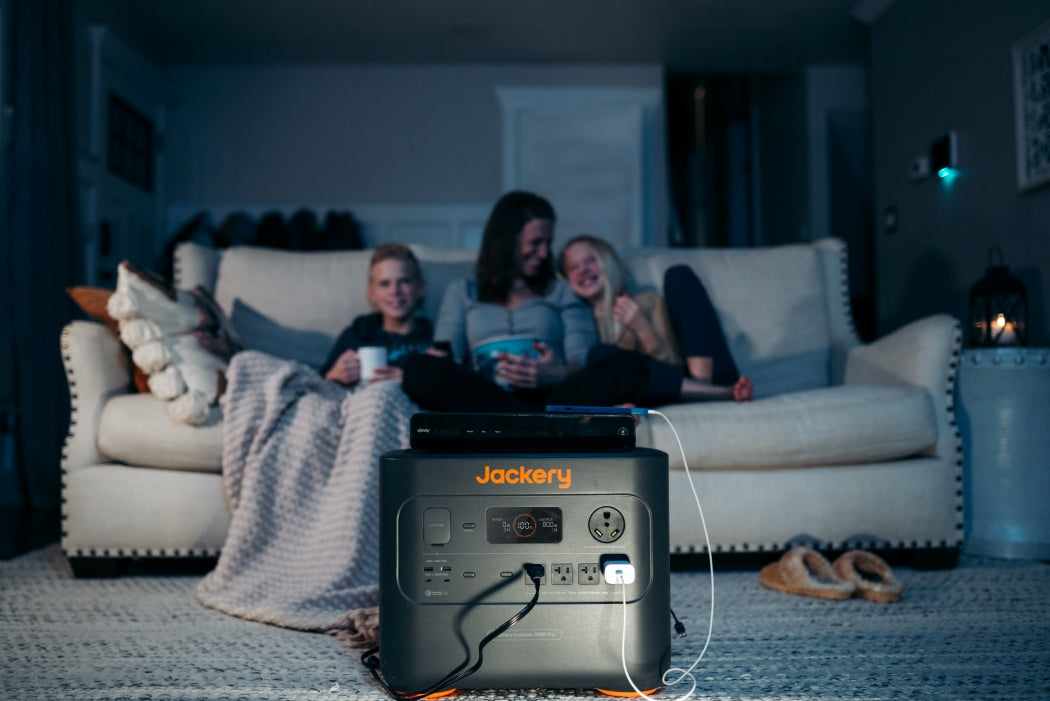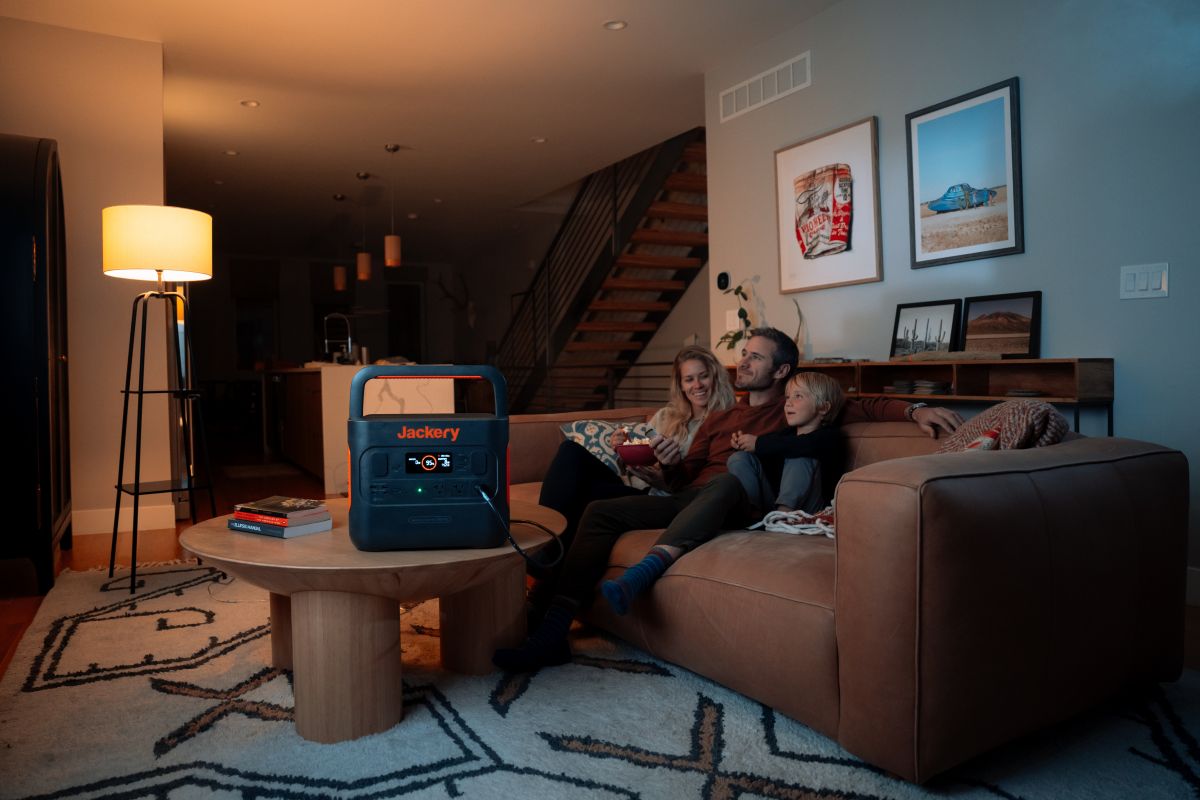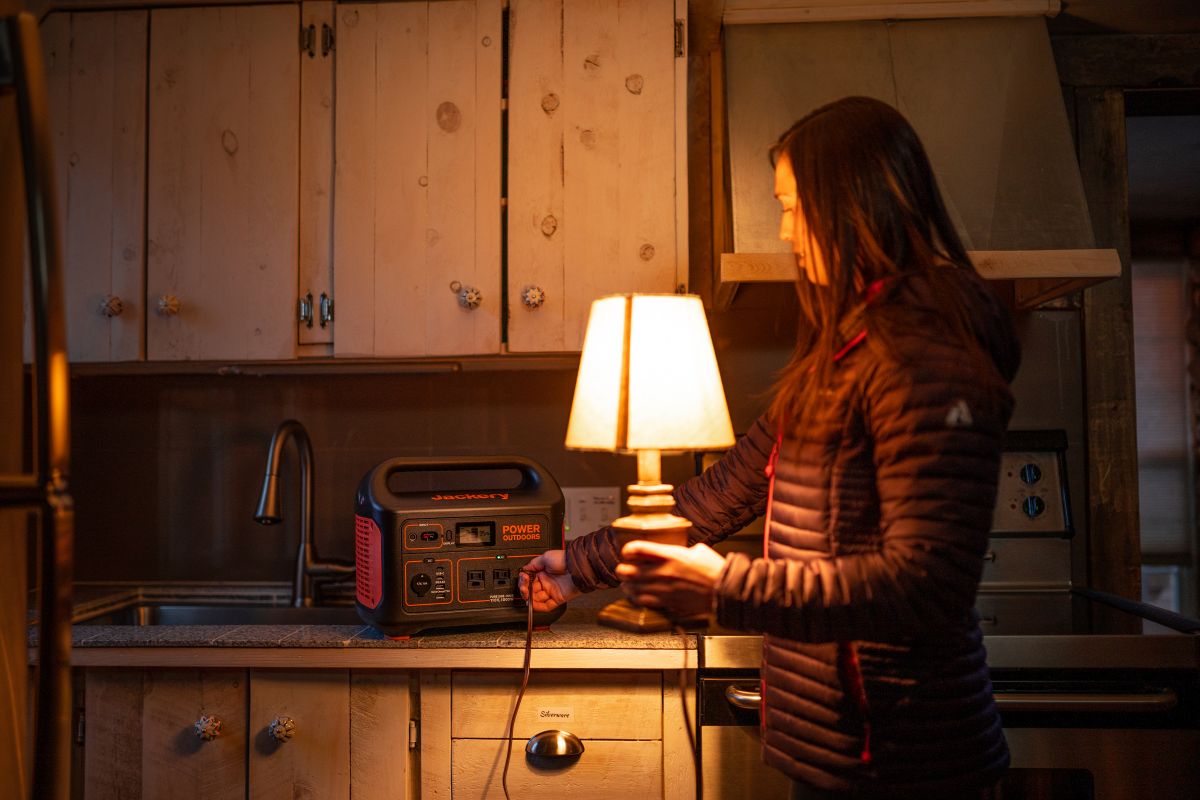Most American households consume 29 or 30kWh per day of electricity or 870 or 900kWh per month. However, the exact electricity consumption will depend on the size of your home, number of households, and your lifestyle. If you're wondering how many kWh does a house use, you can check out the total wattage consumption of the appliances you're using at your home.
Jackery Solar Generators are reliable, safe, and eco-friendly charging solutions for households. They are portable by nature and can charge small or heavy-duty appliances for long hours to save money on high electricity bills. Read this guide to learn how many kWh a house uses per day, per month, and per year. Also, check out how to reduce home power consumption.
How Many kWh Does A House Use?
Kilowatt-hour, or kWh, is a unit of energy that measures how much electricity an appliance or home consumes in an hour. In 2023, the average annual electricity consumption for a US residential electricity usage was 10,557 kWh. The monthly kWh consumption of residential space was nearly 880 kWh.
There are a few different yet simple ways to calculate your home’s electricity usage. But, before finding out how many kWh your home uses, it’s essential to understand a few related terms – watts and kilowatts.
Wattage measures the electrical power and can be calculated using a simple formula.
Watts = (kWh × 1000) ÷ Hours
Once you have the watts, you can easily calculate kilowatts by dividing the result by 1000.
How Many kWh Does A House Use Per Day, Per Month, and Per Year in the US?
Now let us answer the most commonly asked question, “How many kWh does a house use per day, month, or year.”
In short, there is no single correct answer to the question. A household’s energy consumption may vary depending on factors such as home size, number of home appliances, geographical location, etc.
Let us reveal the daily, monthly, yearly, and instantaneous power usage of a single home in the below table.
|
Frequency |
Usage per household (kWh) |
|
Daily |
29 kWh |
|
Monthly |
890 kWh |
|
Yearly |
10,577 kWh |
|
Instantaneous |
1-3 kW |
Now that we have the answer to “how many kWh does a house use per month, day, and year,” let us discuss the power consumption by a combined house in the US.
|
Frequency |
Usage for all households combined (kWh) |
|
Daily |
3575 billion kWh |
|
Monthly |
108,707 billion kWh |
|
Yearly |
1,304,486 billion kWh |
|
Instantaneous |
148,833 MW (megawatts) |
How Many kWh Does A House Use Per State?
Below we compare the average annual kWh consumption by households in the United States by state.
|
State |
Electricity use per household per month (kWh) |
Average cost per month ($) |
Electricity cost per kWh ($) |
|
Alaska |
552.29 |
124.66 |
0.23 |
|
Alabama |
1144.77 |
143.95 |
0.13 |
|
Arkansas |
1060.04 |
110.33 |
0.10 |
|
Arizona |
1113.69 |
136.70 |
0.12 |
|
Illinois |
697.98 |
88.67 |
0.13 |
|
Louisiana |
1200.58 |
116.07 |
0.10 |
|
Massachusetts |
610.26 |
126.38 |
0.21 |
What is the Average kWh Usage Per Day?
The average kWh usage per day of a normal household is nearly 29kWh. However, it may vary depending on the size of your house, the wattage of the appliances you are using, and other factors. If you want to calculate the average kWh usage per month, consider calculating the wattage consumption of the appliances you use on a daily basis.
How Many kWh Per Day is Normal?
The average US household electricity consumption is 29kWh per day, which means kWh usage of 870kWh per month. It's worth noting that the electricity consumption might vary depending on the house size, location, and number of members in the household.
For instance, it's normal to draw anywhere around 37kWh per day in the hot, sticky South of the US. This is because you'll be running the air conditioner day and night. On the other hand, if you live in the Northwest or West region, you'll require less energy to heat and cool your home.
What is the Average Kilowatt Usage Per Month?
The average kilowatt usage per month is around 890kWh, which might vary depending on multiple factors. The average electricity bill for a 2 person household in the US is around $150 per month, assuming your monthly consumption is 887kWh per month.
What Uses the Most Electricity in a Home?
Every household appliance has different power requirements, which makes it difficult to understand what appliance consumes more energy. You can always generalize that heavy-duty appliances like washers/dryers, hairdryers, ovens, or ACs are major energy users. Here are the appliances that draw more energy from the grid:
Space Cooling: 16.23%
Space Heating: 15.87%
Water Heating: 11.4%
Refrigerators and Freezers: 6.93%
Lighting: 4.36%
TVs and Related Equipment: 3.52%
Computers and Related Equipment: 2.28%
All Other Users: 39.4%
Source: Use of electricity - U.S. Energy Information Administration (EIA)
What Factors Affect How Many kWh Does A House Use?
Several factors can affect a home’s monthly electricity bill and average household electricity consumption kWh per day, including the appliances used daily, where you live, and how big the house is. Let us discuss these factors briefly.
Number & Type of Appliances
If you use more appliances that consume high power, your home will eventually use more kWh. Therefore, the ideal way to lower energy consumption is by using energy-efficient Energy Star-certified appliances.
Home Location
The location of your home has a direct impact on the working of heating and cooling systems. For instance, if you live in a cool area, you will have to run space heaters longer than someone living in a moderate climate.
Average kWh Per Square Foot
As a general thumb rule, a larger home will consume more electricity than a small space. The table below provides monthly kWh consumption and average electricity bill based on square footage:
|
Home Size (in Square Feet) |
Estimated Monthly kWh Usage |
Average Monthly Bill 2024 |
|
1,000 |
500 – 1,000 kWh |
$83.4 - $166.8 |
|
1,500 |
750 – 1,500 kWh |
$125.1 - $250.2 |
|
2,000 |
1,000 – 2,000 kWh |
$166.8 - $333.6 |
|
2,500 |
1,250 – 2,500 kWh |
$208.5 - $417.0 |
|
3,000 |
1,500 – 3,000 kWh |
$250.2 - $500.4 |
|
3,500 |
1,750 – 3,500 kWh |
$291.9 - $583.8 |
|
4,000 |
2,000 – 4,000 kWh |
$333.6 - $667.2 |
|
4,500 |
2,250 – 4,500 kWh |
$375.3 - $750.6 |
|
5,000 |
2,500 – 5,000 kWh |
$417.0 - $834.0 |
Note: Remember, these values are estimates and may vary depending on your household's electricity consumption. The average monthly bill is calculated using the electricity rate of 16.68 cents per kWh.
What Is The Average Home Power Consumption?
The appliances that run the whole day use more electricity than those you use occasionally. Here is the average power consumption by home different appliances. Here, we will reveal how many watts does a fridge uses and how many watts does a microwave uses, along with other appliances:
Kitchen Energy Usage
- Dishwasher: 1200 to 1500 watts
- Refrigerator: 150 to 400 watts
- Coffee maker: 800 to 1400 watts
- Microwave: 966 to 1723 watts
- Oven: 2150 watts
Living Room Energy Usage
- Flat-screen TV: 60 to 115 watts
- Laptop: 50 to 100 watts
Laundry Room Energy Usage
- Dryer: 1000 to 4000 watts
- Washing machine: 500 watts
Central Cooling or Heating System Energy Usage
- Window AC unit: 900 to 1440 watts
- Central air conditioner: 1000 to 4000 watts
- Portable electric fan heater: 2000 to 3000 watts
- Central heating furnace: 340 watts
Miscellaneous
- WiFi: 5 to 20 watts
- Computer: 30 to 70 watts
- Treadmill: 600 to 700 watts
- Phone charger: 5 watts
How To Reduce Home Power Consumption?
There are several simple practices you can follow to reduce your home’s electricity usage. Simple steps that can help you maintain a more energy-efficient home and reduce your monthly power bills include:
Use Energy-Efficient Appliances
While buying appliances, make sure it has a yellow ENERGY STAR ® label. These devices are tested and qualified to consume less electricity. But how to save electricity? One of the best ways to save electricity is by investing in energy-efficient appliances. As mentioned above, Energy Star-certified appliances draw less energy from the utility grid to help you save money on electricity bills.
Increase Home Insulation
Cooling and heating systems are the most power-hungry appliances at home. Maintaining proper insulation and ensuring the heating/cooling system works efficiently are the key steps to reduce monthly energy consumption.
Unplug Electronics
Plug out the devices that consume electricity when you are not using them.
Invest in Solar Generator
Reducing reliance on the electricity grid and harnessing the power of solar energy can help you reduce monthly energy costs. Jackery Solar Generators are designed to power most home appliances by converting the sun’s energy into electricity
The solar generator combines Jackery SolarSaga Solar Panels to absorb and convert solar energy, while the power station or battery can store the produced electricity for later use. Charging home appliances using the sun’s energy rather than grid electricity can help you reduce overall electricity bills.
Jackery Solar Generators – Your Home Power Backup Solution
One of the simple yet ideal ways to reduce the kWh consumption of your home is by investing in a solar generator. It combines a portable power station and a few solar panels to absorb, convert, and store electricity. Jackery is a reputed solar product manufacturing company offering different sizes of solar generators and portable power stations.
Unlike gas-guzzling generators, Jackery solar generators are a safe and reliable choice for homeowners. They do not emit noises or harmful gases, making them suitable for indoor use. In addition, investing in a high-capacity solar generator helps you prepare for power outages, blackouts, or brownouts.
Jackery Solar Generator 3000 Pro
The Jackery Solar Generator 3000 Pro is one of the reliable home battery backups with NMC batteries. It is a reliable charging solution that can charge 99% of your household appliances to reduce your reliance on the electricity grid and save money on monthly bills. You can use the Jackery SolarSaga Solar Panels to charge the Jackery Explorer 3000 Pro Portable Power Station and power appliances, making the solar generator a reliable and safe choice.

|
Product |
Capacity |
Home Appliances |
|
Solar Generator 3000 Pro |
3024Wh |
Dishwasher: 1200 to 1500 watts = 1-2H Refrigerator: 150 to 400 watts = 6-17H Coffee maker: 800 to 1400 watts = 1-3H Microwave: 966 to 1723 watts = 1-3H Oven: 2150 watts = 1H Dryer: 1000 to 4000 watts = 38 - 154 Min Washing machine: 500 watts = 5H Flat-screen TV: 60 to 115 watts = 11-42H Laptop: 50 to 100 watts = 25-51H AC unit: 900 to 1440 watts = 1-3H |
Jackery Solar Generator 2000 Plus
If you're looking for a solar generator that can expand depending on your electrical consumption, you may trust the Jackery Solar Generator 2000 Plus. The upgraded BMS technology ensures safe operation and no equipment damage when charging the appliances. It can supply steady power to appliances when there is an extended power outage, blackout, or brownout. When you're charging heavy-duty appliances with a solar generator, it helps you reduce the total kWh consumption.

|
Product |
Capacity |
Home Appliances |
|
Jackery Solar Generator 2000 Plus |
2-24kWh |
Dishwasher: 1200 to 1500 watts = 1.1-1.4H Refrigerator: 150 to 400 watts = 4.3-11.5H Coffee maker: 800 to 1400 watts = 1.2-2.1H Microwave: 966 to 1723 watts = 1.0-1.8H Oven: 2150 watts = 48 min Dryer: 1000 watts = 1.7H Washing machine: 500 watts = 3.4H Flat-screen TV: 60 to 115 watts = 15.0-28.8H Laptop: 50 to 100 watts = 17.3-34.7H AC unit: 900 to 1440 watts = 1.2-1.9H |
Jackery Solar Generator 2000 Plus Kit (6kWh)
The Jackery Solar Generator 2000 Plus Kit (6kWh) is another large-capacity power solution that can charge most household appliances for long hours. When you have the solar generator handy, you can get an uninterrupted power supply during power outages or blackouts. It features a LiFePO4 battery with a 10-year lifespan and fully upgraded BMS technology to provide an optimum charging experience. You can reduce the total kWh consumption with the help of a solar generator.

|
Product |
Capacity |
Home Appliances |
|
Jackery Solar Generator 2000 Plus Kit (6kWh) |
6128.4Wh |
Dishwasher: 1200 to 1500 watts = 3.4-4.3H Refrigerator: 150 to 400 watts = 13.0-34.7H Coffee maker: 800 to 1400 watts = 6.5-11.4H Microwave: 966 to 1723 watts = 3.6-6.5H Oven: 2150 watts = 2.4H Dryer: 1000 to 4000 watts = 1.3-5.2H Washing machine: 500 watts = 10.3H Flat-screen TV: 60 to 115 watts = 44.5-85.4H Laptop: 50 to 100 watts = 51-102H AC unit: 900 to 1440 watts = 3.6-5.7H |
How Many kWh Does A House Use FAQs
What size solar generator do I need for my home?
To calculate the ideal size generator to run a house, you will need to determine the appliances you want to power up. For example, suppose you want to power multiple devices with a total power consumption of around 1500 watts.
If you use Jackery Solar Generator 3000 Pro, you can calculate working time using a simple mathematical formula.
Working Time = Capacity in Wh * 0.85 / Operating wattage = 3024Wh × 0.85 / 1500 = 1.7 hours.
The pass-through charging feature ensures you can power appliances while keeping the portable power station plugged in for recharging.
What is the average household electricity usage?
The average U.S. household consumes about 10,500 kilowatt-hours (kWh) of electricity per year.
How much electricity does a house use per day or How many kilowatts does a house use?
On average, the average home kWh per day of a US household lies anywhere between 29 - 30kWh per day of electricity.
What is the average cost of electricity per month?
The average rate of electricity in the US is around 16.10 cents per kWh. If you are drawing around 890kWh per month, the average cost of electricity per month will be $143.29.
How much electricity does the US use in a year?
According to EIA, the US electricity consumption in 2022 was about 4 trillion kWh (kilowatt-hour).
What are the energy-efficient appliances at home?
Energy Star-certified appliances are the most energy-efficient as they use less power to run.
Is a solar generator worth it?
In short, yes. A solar generator can help you reduce environmental impact, lower electricity bills, and save costs in the long run. In addition, they come with a rechargeable battery to ensure you can power devices day and night.
Final Thoughts
Understanding “how many kWh does a house use” will help you invest in the ideal size solar generator and control your overall electricity consumption. If you want to save more on your energy bills, consider investing in Energy Star-certified appliances. Additionally, you can consider investing in safe and reliable power solutions, like Jackery Solar Generators.
If you want a reliable charging solution that can charge 99% of your appliances and lower electricity bills, consider Jackery Solar Generator 3000 Pro. On the other hand, if you want an expandable and versatile solution, you may invest in the Jackery Solar Generator 2000 Plus. With these solar generators, you can charge most of your household appliances for hours.
































































































![[Add - on] Jackery Manual Transfer Switch for Explorer 5000 Plus - Jackery](http://www.jackery.com/cdn/shop/files/add-on-jackery-manual-transfer-switch-for-explorer-5000-plus-9017324.png?v=1754016782&width=420)




















































































































![[Add - on] Jackery Manual Transfer Switch for Explorer 5000 Plus - Jackery](http://www.jackery.com/cdn/shop/files/add-on-jackery-manual-transfer-switch-for-explorer-5000-plus-9017324.png?v=1754016782&width=324)


























